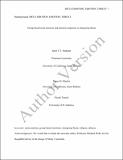Files in this item
Group-based meta-emotion and emotion responses to intergroup threat
Item metadata
| dc.contributor.author | Pauketat, Janet V. T. | |
| dc.contributor.author | Mackie, Diane M. | |
| dc.contributor.author | Tausch, Nicole | |
| dc.date.accessioned | 2020-12-27T00:39:17Z | |
| dc.date.available | 2020-12-27T00:39:17Z | |
| dc.date.issued | 2019-12-27 | |
| dc.identifier | 265544864 | |
| dc.identifier | 9f875288-f15e-45ee-b210-4ebdbc7a2f48 | |
| dc.identifier | 85077364296 | |
| dc.identifier | 000522602700011 | |
| dc.identifier.citation | Pauketat , J V T , Mackie , D M & Tausch , N 2019 , ' Group-based meta-emotion and emotion responses to intergroup threat ' , British Journal of Social Psychology , vol. Early View . https://doi.org/10.1111/bjso.12364 | en |
| dc.identifier.issn | 0144-6665 | |
| dc.identifier.other | RIS: urn:6B7F2C506A38EAA1A2833EFBB51161F0 | |
| dc.identifier.other | ORCID: /0000-0002-9471-0673/work/67167605 | |
| dc.identifier.uri | https://hdl.handle.net/10023/21208 | |
| dc.description | This material is based upon work supported by the National Science Foundation Graduate Research Fellowship under Grant No. (DGE‐1144085). | en |
| dc.description.abstract | In a secularizing world, religious groups are increasingly threatened by anti‐religious groups. We present two studies investigating religious peoples’ responses to anti‐religious threats. We expected intergroup threats to shape group‐based emotions and behavioural intentions through a novel pathway whereby threat affects group‐based meta‐emotions: the ingroup’s perception of the outgroup’s emotions towards the ingroup. In Study 1, we experimentally manipulated threat and group salience with participants from two different cultures (British and Latinx/Hispanic). Study 1 demonstrated non‐interactive effects of threat increasing negative emotional responses and of group salience strengthening emotional responses. The results illustrated the role of group‐based meta‐emotions in predicting outgroup‐directed emotions and behavioural response intentions. Study 2 used a different manipulation of threat in an American sample and an identity‐based manipulation of salience to assess the impact of real‐world anti‐religious campaigns involving symbolic and realistic threats. Both threat types increased negative group‐based meta‐emotions, negative outgroup‐directed emotions, desire to respond, and opposition to the anti‐religious campaign compared to no threat. Overall, religious identity salience had little impact on outcomes. The indirect pathway through meta‐emotion replicated, suggesting the importance of considering this novel meta‐emotion pathway in intergroup relations. | |
| dc.format.extent | 933340 | |
| dc.language.iso | eng | |
| dc.relation.ispartof | British Journal of Social Psychology | en |
| dc.subject | Group-based emotions | en |
| dc.subject | Intergroup threat | en |
| dc.subject | Meta-emotion | en |
| dc.subject | Religion | en |
| dc.subject | Salience | en |
| dc.subject | BF Psychology | en |
| dc.subject | DAS | en |
| dc.subject.lcc | BF | en |
| dc.title | Group-based meta-emotion and emotion responses to intergroup threat | en |
| dc.type | Journal article | en |
| dc.contributor.institution | University of St Andrews. School of Psychology and Neuroscience | en |
| dc.identifier.doi | 10.1111/bjso.12364 | |
| dc.description.status | Peer reviewed | en |
| dc.date.embargoedUntil | 2020-12-27 |
This item appears in the following Collection(s)
Items in the St Andrews Research Repository are protected by copyright, with all rights reserved, unless otherwise indicated.

